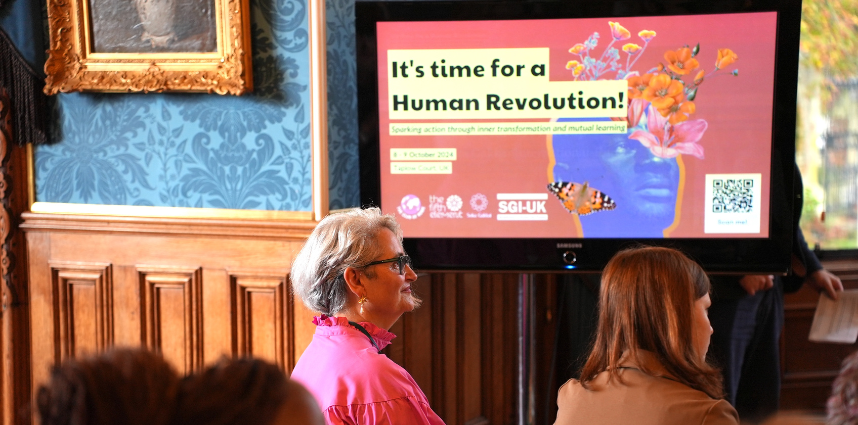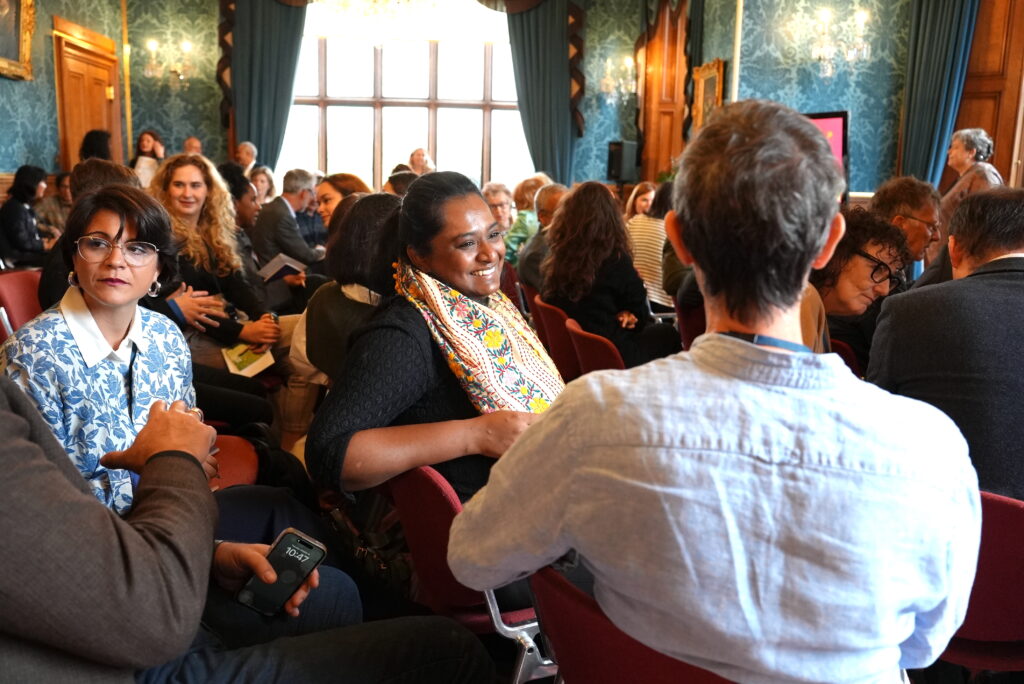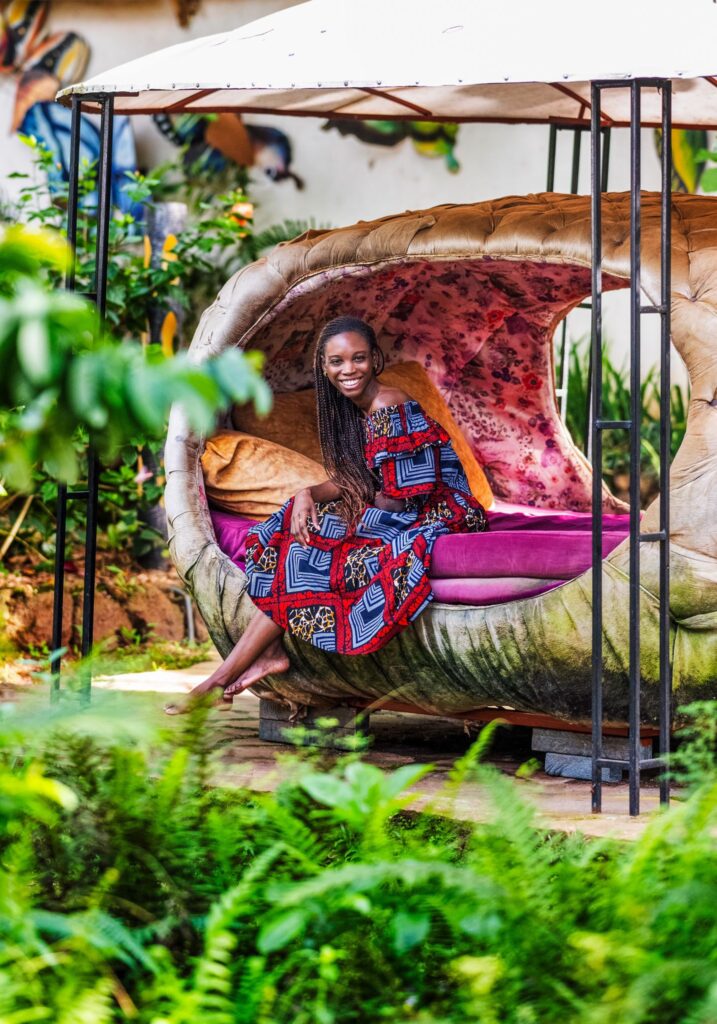Youth thoughts for catalysing a human revolution
By Lucy Plummer, Soka Gakkai International representative to the UN for Youth Engagement, with contributions from Louis Peters, Kerrin Heba Massarueh and Hemavathi S. Shekhar
27 October 2025

The question of how to catalyse a human revolution is perhaps the most pressing question of our time. How we respond to the issue of how we, human beings as the prime movers and shapers of society, can revitalise our lives, becoming a positive and contributive force for our planet, will determine humanity’s collective future.
The Club of Rome co-founder Dr. Aurelio Peccei (1908–84) and Soka Gakkai International (SGI) President Daisaku Ikeda (1928–2023) discussed the question of the human revolution at great length in a series of dialogues published in book form in 1974 as Before It Is Too Late. Reflecting on how human beings, in particularly those from high-income countries, can unearth their inner riches and put them into positive use to respond to global problems, which includes growing global inequalities, environmental destruction and climate change, Peccei and Ikeda arrived at the shared conclusion that this would only be made possible through changing what we value; a deep inner transformation in the hearts of individuals that they called “human revolution.”
In October 2024, The Club of Rome and Soka Gakkai, in collaboration with The Fifth Element, The 50 Percent, SGI-UK and the Centre for Applied Buddhism, co-organised a two-day conference titled “It’s time for a human revolution! Sparking action through inner transformation and mutual learning”, picking up this vital discussion 40 years later. The conference’s theme, ‘asking better questions’, guided the participants in small groups through a series of dialogues which explored in depth three aspects of relations – with self, with others and with environment – considering how our beliefs and values shape the quality of those relations.

This article gathers reflections from three youth who attended the conference and participated in the dialogues, sharing what they took away and their thoughts on the necessity of a human revolution to address systemic issues and empower change.
Kerrin Heba Massarueh on the theme of ‘humans and self and inner transformation for systemic change’

“The defining moment of the conference came when the dialogue turned inward, when participants were invited to recognise that systemic change in the world begins with inner transformation. As we discussed the inseparable link between the self, others and nature, it became clear that the human revolution is not only philosophical; it is a living practice of humility, mutual learning and courage to evolve from within. That moment reframed leadership and activism not as acts of power, but as acts of consciousness, a call to transform the systems within ourselves that mirror the inequities, divisions and disconnections we see globally. It was a profound realisation that, the revolution humanity needs is first and foremost human. Human revolution begins within, in the courage to transform the inner systems that perpetuate separation, fear and exhaustion. We are being asked not simply to change the world, but to change ourselves in relation to it. For me, the conference was not just a moment of realisation but a mirror reflecting back the need to build systems that heal rather than deplete, to cultivate communities that learn together rather than compete, and to recognise that true revolution begins in how we choose to relate to ourselves, to one another and to the Earth.”
Louis Peters on the theme of ‘humans and others and trusting the humanity in everyone’
‘When we are good, we ask better questions about the future of humanity.’ This statement posed by Carlos Álvarez Pereira, Secretary General of The Club of Rome, has stayed with me, along with the chance to reflect on what we are still missing in the pursuit of happiness – ‘betting on the humanity of everyone’, and ‘learning from life’. In a word, it’s trust. The challenge is learning how to trust in everyone’s humanity. Looking at the state of the world, this can feel almost impossible, but we must never give up. Betting on the humanity of others takes constant effort and requires an ongoing openness to learning, something that is synonymous with the progress of our individual human revolution. When trying to influence systems, we see an array of misaligned people straying from the target of collective wellbeing. This is similar to the way that specks of iron are disordered in the absence of a magnet. Acknowledging the need for, and, more importantly, undergoing a human revolution, can be seen as the magnet that aligns us all with our collective true north, that is, the best future for humanity and our environment.”

Hemavathi S. Shekhar on the theme of ‘humans and nature and learning about life from nature’

“There’s a movement going on across the world called ‘Rights of Nature’ where we look at nature including lakes, rivers, forests or certain ecosystems, as an entity just like human beings with rights. In my group we did an exercise where we imagined ourselves as an element of nature, and asked, what do you think I am entitled to for my existence? It was a beautiful experience. We are always saying that you should do no harm to nature as if it’s a human obligation to spare nature, but it indirectly creates some level of hierarchy or superiority. The approach is not taken by us in terms of their rights. We look at nature as something to dominate over, but it comes down to having empathy. How would you feel if somebody constantly threw sewage on you? Because that’s what we do to rivers and oceans and lakes and they’re living beings.”
To conclude, the conference demonstrated how a human revolution can be catalysed – through meaningful, life-to-life encounters between individuals of diverse ages, backgrounds, beliefs and values coming together, not as academics, business leaders, educators but as human beings who share a concern for humanity and the planet as a whole and an open mind and heart to embark on a journey of mutual learning from which the possibilities for new realities to emerge are endless.

